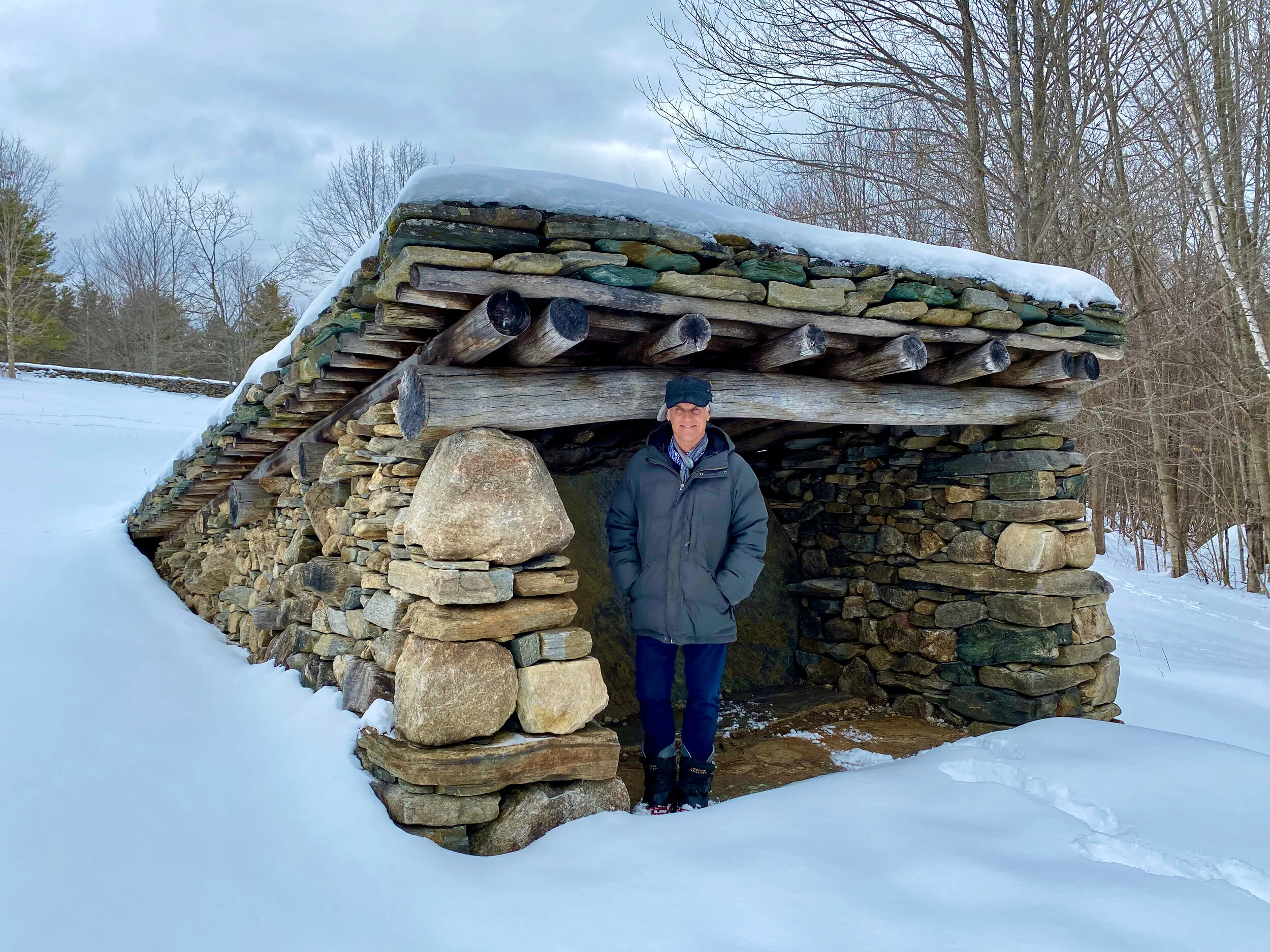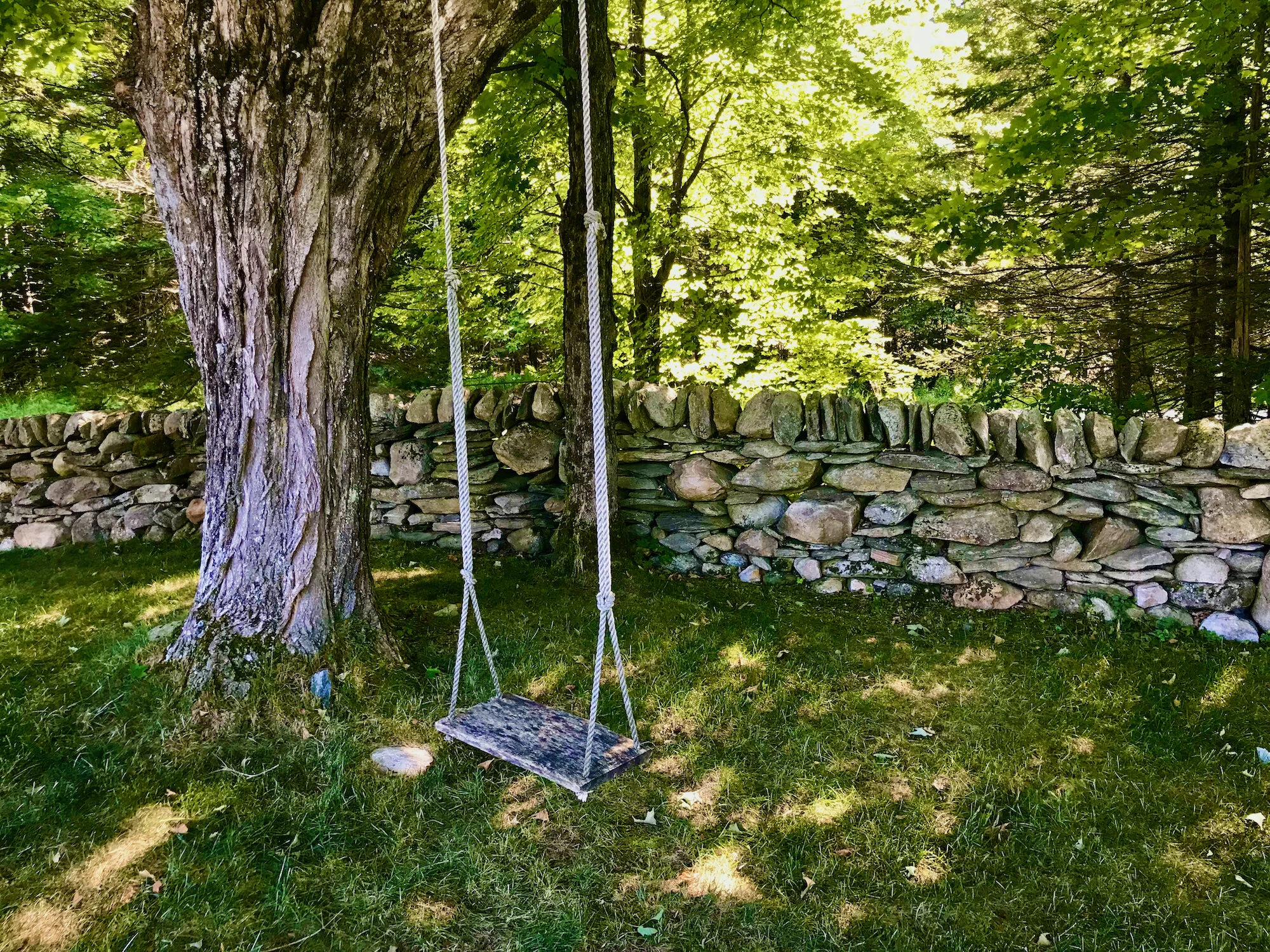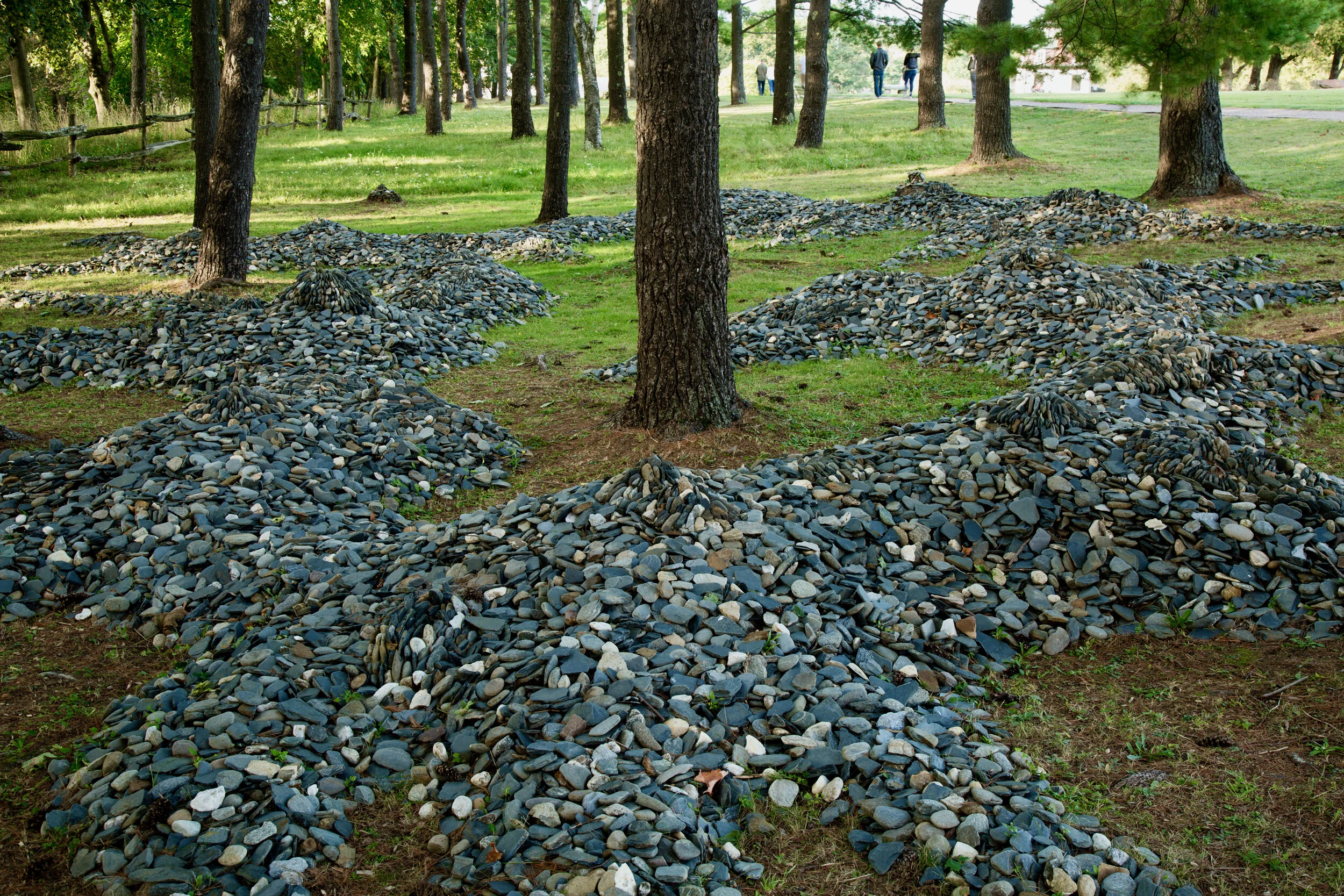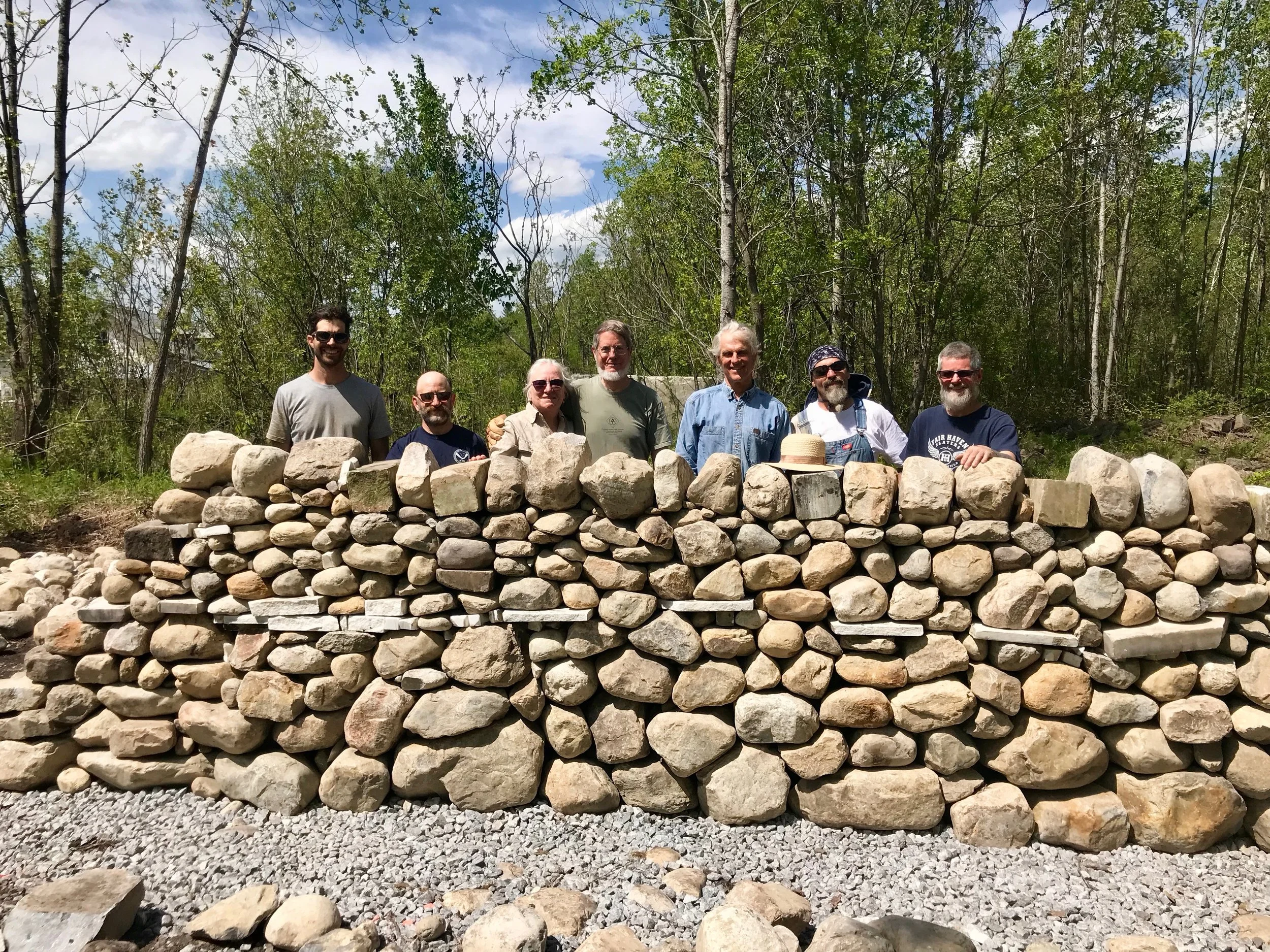Rock Shelter is an environmental artwork that pays tribute to the materials it’s made from and the place it resides. The sculpture stands unpretentiously on the verge of a Vermont hayfield; a solitary figure with its back to the wind and face lifted to the low winter sun. The only perceivable change in the work since its creation is the mottled patina that’s grown over it.
Read MoreHearing the episode for the first time, the editing of my thoughts that are usually hashed out on the written page were magically accomplished without any effort at all on my part. Stefan had transformed what I feared would be barely coherent answers to his interview questions, into perfectly reasonable and measured responses!
Read MoreFantasy Topography rose up out of the forest floor last April. It became an object of intrigue for some of the visitors who wandered off the beaten path that circles the museum grounds. The pine tree glade has now returned to its former life as a quiet, shady glen. With all that passes, ours is the choice to hold in memory or let slip away.
Read MoreMost of the works done in the dry stone trade take place without fanfare. They serve basic needs by establishing boundaries, buttressing slopes and moderating ascents. They’re experienced as well-functioning while being hardly noticed. In fact, one sign of a successful new project is that those using it feel that it must have always been there. That doesn’t mean that it can’t be a sight to behold. Functional stonework can be arrestingly beautiful, often the more so with age. Stonework, done right, proves its worth day after day, year after year. The expense is left behind while the value continues forward.
Read MorePublished one hundred sixty-one years ago, the excerpt, below, from the November issue of “The New England Farmer” contains much the same advice contemporary walling instructors offer their students. Interestingly, many of the terms used to describe the craft are recognizable today. Although, as you'll discover in reading the final passage, production expectations have changed substantially since 1858, when a waller laid up, on average, three rods of stone fence in a day.
Read MoreNow and then it’s advisable to break from the routine of solitary building for a few days of walling with a stone compatriot. It’s a chance to share approaches to the craft and backgrounds in the business. Sharing a workspace after being alone takes some adjustment. Another’s safety has to be considered along with one’s own. Trouble can come suddenly and from unexpected quarters. An outcome can be crushing, or as in this tale, just a lesson learned the easy way.
Read MoreTo be in touch and in tune with nature has a centering effect on us. Couple the outdoors with a creative pursuit, and engagement with both is enriched because together they sharpen and heighten our spatial orientation. My environmental art piece Fantasy Topography seeks to bring pleasure to the core.
Read MoreWhat was the first public structure built to safeguard harmony in early agricultural communities? Who were the hog reeves and why were they sometimes recently married, young men? What did impecunious pound-brechers do to deserve 30 lashes? These questions and more will be answered during a program I’ll be giving at the Dummerston Historical Society’s quarterly meeting Thursday July 18th at 7:30 pm. I hope you’ll join me for an evening exploring the history of Dummerston’s town pound and take a walk around the dry stone pound, erected ten years ago, next to the Historical Society building.
Read MoreA belief set in the mind of many beginner dry stone wallers is that a wall is what it looks like on the outside, when it actually is what is not seen, on the inside. To accept a wall stone at face value is to believe that what shows is most of what that stone is, but in a well built wall, most is concealed, securely trapped inside the construction.
Read MoreThe most enjoyable takeaway from examining a wall that has remained true is a validation of the beliefs held while bringing it into being. Dry stone walling is about action in the moment but the results take a while to be proven out. The labor of building is lightened by seeing how honest effort ultimately endures.
Read MoreThe studio has been filling up with rocky toppers this winter. The half-products are elements in a sculpture to be installed as part of a new outdoor exhibition at Shelburne Museum. The uniquely shaped objects will be arranged atop berms of loose stone. The completed piece will sprawl across the floor of a pine forest, flowing between and around the tree trunks.
Read MoreNothing begins without looking back, so, to get 2019 started, I’m taking stock of 2018’s doings.
Thanks for following along. Now, let’s get this new year rockin!
A stone wall builder creates the puzzle as they complete it. The way each piece is picked and positioned answers an immediate question and offers up a new one. Every choice invites another. Action in the moment reduces the work ahead while increasing the choices to be made. Though the labor is demanding, it’s tempered by the gifts brought by doing it. Many small satisfactions weld themselves into the gratification of a desire to complete the picture of a stone wall settled into its place on the land.
Read MoreWhile there remain, across New England, examples of stream-vaulting bridges built more than 100 years ago, the builders of those spans have long since left us. That’s why it’s particularly poignant that The Stone Trust’s recent tour of historic dry stone bridges coincided with the construction of a new one.
Read MoreBasically, wallers are spare-parts jobbers. The loose pieces of indigenous stone they collect and parcel out are really nothing more than the duft of earth’s crowning mantle. In rare cases, bedrock, stone’s “birthmother”, is present on a building site and can come into play as a defining element of a dry stone design.
Read MoreHaving landscaping and stonework done can be a geophysical boost to Earth’s well being in the long run but it’s not without short-term costs. Before the shovel goes in, here are some FAQs for a planet considering a surgical procedure.
Read MoreNavigating the process of a public art proposal feels like a long walk by flashlight through a snowstorm. Signs are unclear and paths become obscure along the way. Because the destination is not a geographically fixed point, there remain, at the conclusion of an artist’s unsuccessful bid to win a competition, questions about where they traveled, and why the trip dead-ended.
Read MoreClay sketches are the instruments of communication I use to express ideas. The truthfulness of any idea is uncovered by thinking and working it through using three-dimensional materials. With clay, a concept forms through the fingers. Questions about a design come up in the activity of applying clay that might not otherwise be addressed until a project is underway. Solving problems in small scale is more easily done than at the full scale of a construction site.
Read More
















